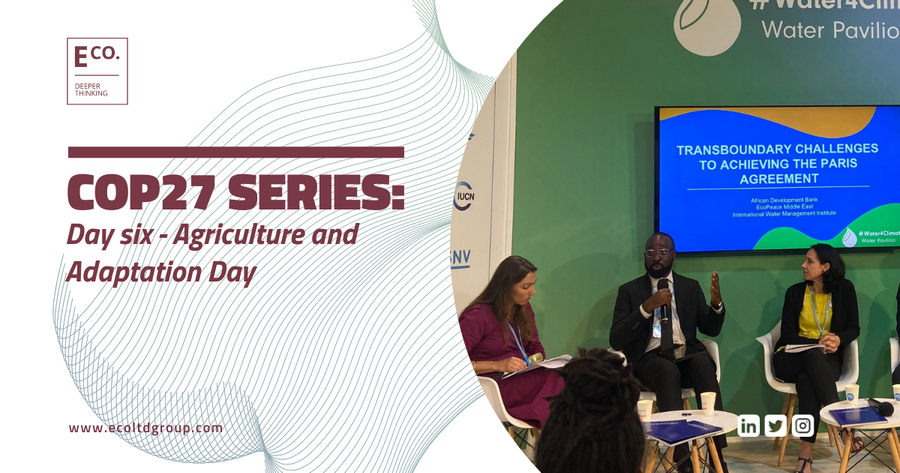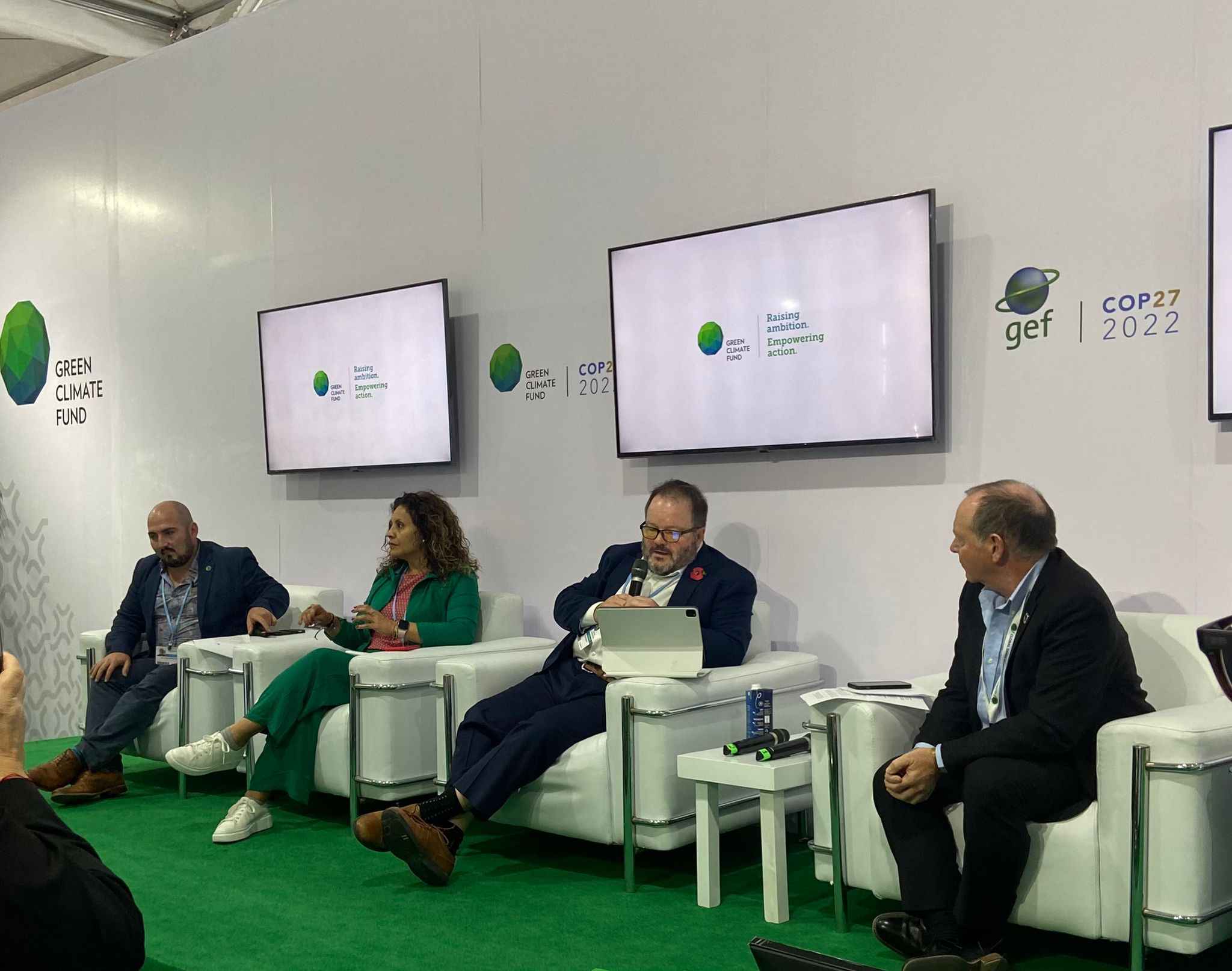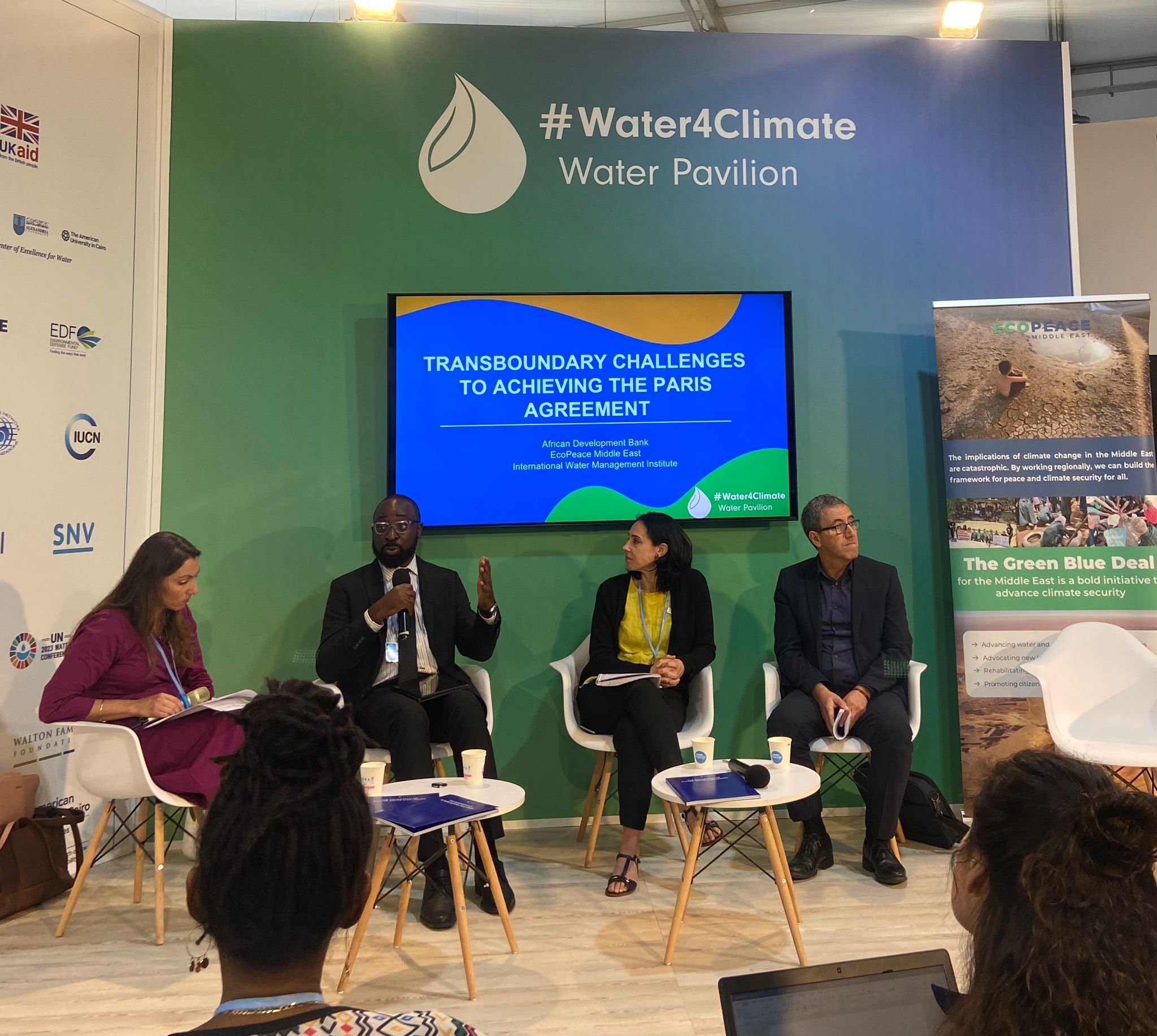COP27: Agriculture and Adaptation Day
14 November 2022, Category: All insights, News, Tags: climate finance, COP27, COP27 Egypt, Green Climate Fund, sustainable development, UNFCCC

Saturday 12 November was Adaptation and Agriculture Day at COP27. This day included a full roster of events catered towards food systems and how they can be adapted to our globally changing climate.
Here is a breakdown of the some of the most interesting sessions held on Agriculture and Adaptation Day at COP27.
- Driving transformational change in agriculture and food security
- Indigenous inclusion in NDC implementation
- Transboundary challenges for water
Driving transformational change in agriculture and food security
The joint GEF-GCF Pavilion hosted a session on driving transformational change in agriculture and food security–a sector that contributes the most to global greenhouse gas emissions.
In order to meet the multiple challenges within the world of agriculture, climate finance needs to be deployed at scale. This event discussed how the Green Climate Fund (GCF) works with partners to support, de-risk and leverage additional investment in climate-resilient food systems. Speakers from the Ministries of Environment of Peru and Jordan and the Inter-American Development Bank (IDB) discussed the need for innovative ways to stop deforestation while ensuring food security.
Of particularly important focus is the Amazon rainforest. The Amazon is currently suffering the highest rate of deforestation in over a decade. Amazonians also have a very high dependence on the surrounding environment for their lives and livelihoods while having the lowest development indices in all of Latin America. This creates a challenging situation where the most vulnerable are also the poorest, therefore compounding impacts.
Forests are critical as they regulate temperature, sequester carbon and are homes to indigenous groups. However, these economic benefits are incredibly difficult to accurately quantify. During this session, Graham Watkins, Climate Change Division Chief at the IDB, stated that one of the key messages for stopping deforestation is to develop the bioeconomy.
Through establishing and fostering an economic environment relating to ecosystems, it becomes far easier to argue that standing forests are vastly more beneficial to society than products resulting from deforestation. There also the need to be pushing for changing the enabling environment regarding how policy allows for deforestation. With a recent change to leadership in Brazil, there is an enormous opportunity for such policy changes to occur.
One GCF project highlighted specifically relating to this is the Amazon Bioeconomy Fund. The multi-country programme will encourage private investment in six key areas of the bioeconomy:
- Sustainable agroforestry;
- Native palm cultivation;
- Non-timber natural forest products;
- Growing native species timber; a
- Aquaculture;
- Community-led nature tourism.
Indigenous inclusion in NDC implementation
As the theme of climate justice continues to gather pace, the Indigenous People’s Pavilion focused on the specific inclusion of Indigenous communities in Nationally Determined Contributions. An assessment of all NDCs shows a clear increase in the number of references to Indigenous Peoples between first and second submissions. In the first submission, 22.4% of NDCs included specific reference to Indigenous Peoples, while 37.7% did in the second submission. Many countries, including the majority of Latin America, Canada, South Africa and Indonesia, made reference in both of their submissions.
Importantly, the panel also discussed the inclusion of Indigenous Peoples in actually preparing NDCs. After all, it is very difficult to create policies or targets aimed at benefitting specific groups if they do not get a say in their development. In the first NDC, 96% of submissions did not include Indigenous participation, with this figure being 86% for second submissions. While this shows progress, NDCs are still way off target in their inclusion of indigenous needs.
The nature of the NDC recognition is fascinating. They can be separated into five topics:
- Indigenous knowledge: Recognised in 21 NDCs in the second submission compared to 18 in the first;
- Indigenous jurisdiction: Recognised in 10 compared to 2;
- Full and effective participation: Recognised in 24 compared to 10;
- Indigenous Peoples as right holders: Recognised in 28 compared to 16;
- References to colonialism: Recognised in 31 compared to 18.
Transboundary challenges for water
Another insightful event was hosted at the Water Pavilion discussing the climate challenges associated with shared water resources. While countries have precise land borders, effective governance of natural resources that span across these borders is tough. Panellists mentioned that there is a lack of enabling environment caused by policy gaps, especially relating to climate change. Many countries do not have any cooperation agreements for shared natural resources. Those that do rarely include reference to climate change because they are often decades old.
One way to overcome extreme weather events that impacts water, speakers mentioned, is to engage in anticipatory actions to try and get ahead of major losses. A special focus was on using forecasting information, such as early-warning systems, to boost preparedness and innovative financing mechanisms to provide the resources ahead of time to minimise loss and damage. The use of forecasting data must not be confined to single countries when the potential climate impacts relate to transboundary resources. Rather, data and the corresponding evidence-based decision-making must transcend political boundaries to tackle vulnerability.
That’s it for our coverage from COP27! We hope you’ve enjoyed following along and we look forward to the outcomes of Week Two!
If you’re interested in reading our breakdowns of previous days of the summit, head to our Further Thinking section.
Let’s accelerate climate action together
Let’s accelerate progress together: Get in touch with our climate finance consultants to discuss a project you’re working on. Email us at: amy@ecoltdgroup.com or find us at the following:
Twitter: @ecoltdnews
LinkedIn: E Co.
Instagram: @ecoltdnews
Please feel free to share your comments below or send an email to: gcfinsight@ecoltdgroup.com


Join the conversation by posting a comment below. You can either use your social account, by clicking on the corresponding icons or simply fill in the form below. All comments are moderated.